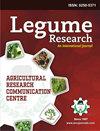Enhancing Production of Berseem through Integrated Crop Management Practices in Haryana
IF 0.8
4区 生物学
Q3 AGRONOMY
引用次数: 0
Abstract
Background: Berseem plays an important role as fodder, in the health and nutrition of a large livestock population in India. The productivity of green fodder per unit area could be increased by adopting recommended scientific and sustainable packages and practices. Methods: Farmers’ participatory front line demonstrations on integrated crop management (ICM) practices and traditional method of sowing as farmers’ practice (FP) were conducted during Rabi (2016-17 to 2018-19) under CCS, HAU, Krishi Vigyan Kendra, Fatehabad and Jhajjar, Haryana. Result: The study reveals that on an average 744 q/ha green fodder yield of berseem (var. HB 2) was recorded under ICM as compare to 659 q/ha in FP which was 12.9 per cent higher over that of the FP. The pooled value of extension gap, technology gap and technology index was to the tune of 85, 36 q/ha and 4.6 percent, respectively. The data on economic parameters reveals that a net return of Rs. 30441 per ha was recorded under ICM compare to Rs. 20065 per ha in FP. The benefit-cost (B:C) ratio was figured 1:1.50 and 1:1.33 in ICM and FP, respectively, suggesting its higher profitability and economic viability of the technology demonstrated. Cluster Front line demonstration also helped in replacement of local varieties with improved recommended varieties.通过哈里亚纳邦的综合作物管理实践提高Berseem的产量
背景:Berseem作为饲料在印度大量牲畜的健康和营养中起着重要作用。采用推荐的科学和可持续的一揽子计划和做法可以提高单位面积青饲料的生产率。方法:在哈里亚纳邦的CCS、HAU、Krishi Vigyan Kendra、Fatehabad和Jhajjar,在Rabi(2016-17至2018-19)期间,农民参与了作物综合管理(ICM)实践和传统播种方法作为农民实践(FP)的一线示范。结果:研究表明,在ICM下,绿饲料产量平均为744 q/ha,而在FP下为659 q/ha,比FP高12.9%。扩展差距、技术差距和技术指数的综合值分别为85.6%、36.6%和4.6%。经济参数数据显示,ICM的净收益为每公顷30441卢比,而FP的净收益为每公顷20065卢比。ICM和FP的效益成本(B:C)比分别为1:1.50和1:1.33,表明该技术具有较高的盈利能力和经济可行性。集群前线示范也有助于用改良的推荐品种取代当地品种。
本文章由计算机程序翻译,如有差异,请以英文原文为准。
求助全文
约1分钟内获得全文
求助全文
来源期刊

Legume Research
AGRONOMY-
CiteScore
1.30
自引率
37.50%
发文量
256
审稿时长
6-12 weeks
期刊介绍:
Legume Research An International Journal. The Journal is an official publication of Agricultural Research Communication Centre. It is designed to bring out the original research articles on genetics, breeding, physiology, bacterial avtivity, production, quality, biochemistry and seeds of legumes crops. The objective of the journal is to serve as a forum for scientific community to publish their research findings on legumes ans to provide basis for new research. Journal is being scanned in the important indexing and abstracting services.
 求助内容:
求助内容: 应助结果提醒方式:
应助结果提醒方式:


